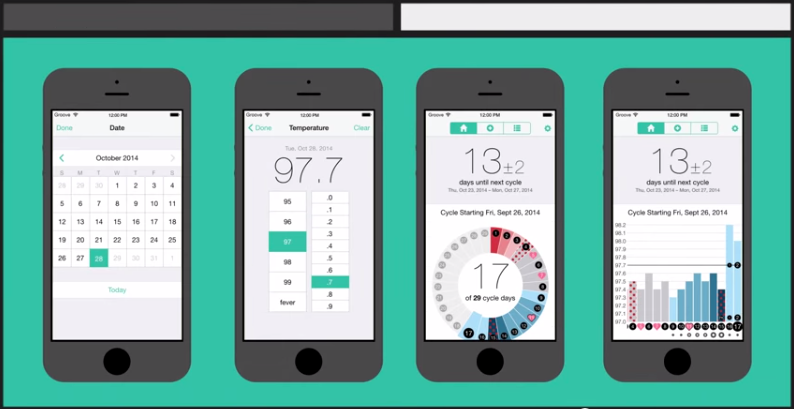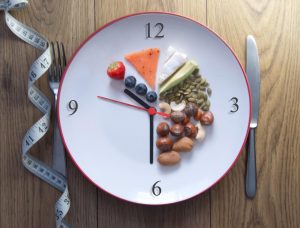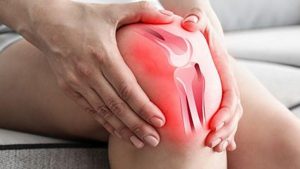JENNIFER ALDORETTA, a trained engineer, created the Groove app when she realized that that she could combine her experience with side effects on the Pill with her interest in pioneering innovation in the area of women’s health. Groove supports women in tracking their fertility cycles for the purpose of achieving or avoiding pregnancy, or in order to have a better grasp of their reproductive health. Part of Aldoretta’s mission is to support education in body literacy, which has led her to author an e-book, titled The Cycle. She’s also launched a campaign titled #KnowYou, which features a video highlighting the issue of how little women know about how their own bodies work. Aldoretta sat with LadyClever (figuratively speaking) to fill us in on her project.
Fertility awareness, and specifically fertility or period tracker apps, have been in the news a lot lately. Is there anything that has been reported that you’d like to take this opportunity to correct or clarify?
The most damaging thing, to my mind, is that women who practice fertility awareness or use fertility trackers are seen as inherently irresponsible. But I think a lot of that stems from fertility awareness being discussed as a singular method, with most stats on effectiveness lumping together every method that falls under the umbrella of “fertility awareness,” including the rhythm method and withdrawal. It’s incredibly misleading, and it’s the main reason I use the term “sympto-thermal method” instead when discussing what I advocate and what Groove supports.
Why do you think it seems to be easier for the media to grasp the misleading idea that “an app can be your new birth control” – as though it could do this independent of you providing data – than to consider the idea of women using the app as only one tool in their fertility tracking process?
Convenience is sexy in today’s world. I think the idea that an app can be a magic birth control fix is appealing, so the media just runs with it. It’s easier to simplify what these types of apps do, even if that means being wrong, than to be honest about their complexity.
Why do you think there seems to be so much judgment directed at women for the birth control methods they choose to use?
This is something I’ve thought about a lot, and I’m still not sure I have a good answer. Women have fought really hard for bodily autonomy, so when a woman chooses to use that autonomy to practice a birth control method that’s thought to be outdated or inferior (even though the sympto-thermal method is in fact neither), I think some see it as a slap in the face to feminism. But this judgment is actually anti-feminist if you think about it. Women should be afforded the freedom to choose the birth control method that’s right for them, free of judgment and shame.
What do you feel is driving the increasing interest in fertility awareness or cycle tracking
I think a lot of it has to do with the quantified self movement we’re seeing in the tech industry. Apps and fitness trackers have proven how useful it is to track our bodies’ data, and they’re showing us that we have far more control over our health than previously thought. The increasing trend towards “natural” living is also a huge factor. As more women are choosing to eat organic and eliminate endocrine-disrupting chemicals from their households, they’re realizing that putting synthetic hormones into their bodies every day no longer jives with their lifestyles.
How did you respond when you discovered that Apple had neglected to include the menstrual cycle in its built-in Health app?
Sadly, I wasn’t all that surprised. Tech is a male-dominated industry, which means that women’s problems are, oftentimes, not even considered. But having worked in tech for many years, I don’t think it’s intentional. Innovators solve problems that they can personally identify with, so it makes sense for a male-dominated industry to disproportionately solve men’s problems. We’re already seeing this change as more women start companies.
In regards to the #KnowYou campaign — what do you think is responsible for the lack of education or body literacy that is highlighted by the video?
We can’t expect people to know something they never learned, so our school systems play a big role. If we dig deeper, I think a lot of it is political. Sex-ed curriculums are gutted because of the politics around contraception, but I think there can be a middle ground. We can still give girls the information they need to understand how their bodies work without getting political.
How did you come to learn about your reproductive system?
A few years ago, I started having all sorts of weird issues like heart palpitations, chronic dizziness, and shortness of breath. After seeing a lot of specialists, I eventually figured out (without the help of my doctors) that it was caused by the Pill. When I stopped taking it and started looking for natural alternatives, I found myself knee-deep in all the information I should have been taught in sex ed. And Groove was born!
As the interest in learning the sympto-thermal method becomes more widespread, how do you think it could be handled on a national level?
Well, I obviously think that apps are going to play a big role in the coming years. I know there are a lot of folks out there who are opposed to women relying on apps to learn about the sympto-thermal method. Even as an app developer, I’m skeptical. But the trends are clear, and we need to meet people where they’re at instead of resisting a trend that likely won’t reverse. That means it’s more important than ever for app developers, advocates, and educators to work together to ensure the information being provided is truly comprehensive.
 Women have a hard time accepting their bodies in general, which is why there are now body positivity campaigns and movements about the acceptance of the body’s exterior appearance. How do you think fertility awareness, body literacy, and the #KnowYou campaign fit in to this trend?
Women have a hard time accepting their bodies in general, which is why there are now body positivity campaigns and movements about the acceptance of the body’s exterior appearance. How do you think fertility awareness, body literacy, and the #KnowYou campaign fit in to this trend?
I think learning about the body’s interior has the potential to be the driving factor in helping many women accept the exterior. After learning about all the amazing data I could gather from my cycles, I found myself thinking, “Wow, my body is really badass!” for the first time in my life.
That’s really the whole point of Groove’s #KnowYou campaign. Yes, changing the media to include more diverse body types is unquestionably empowering, but so is knowing exactly what’s going on in your body at any given time and being able to use that information to your benefit.
To learn more about Groove’s mission to spread body literacy, check out its website. And if you’re ready to download the app on iOS and try it out for yourself (and why wouldn’t you? The app is currently free to download), head on over to iTunes to get started.


















